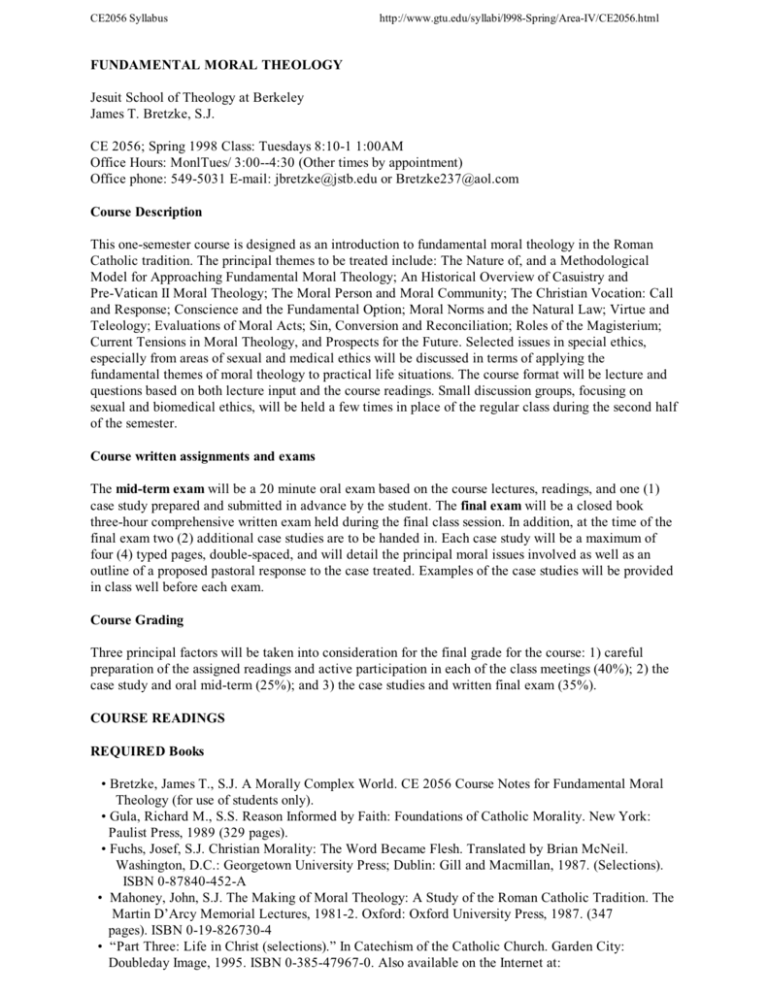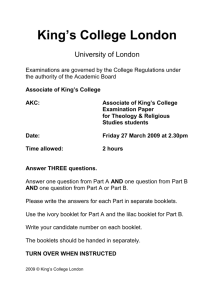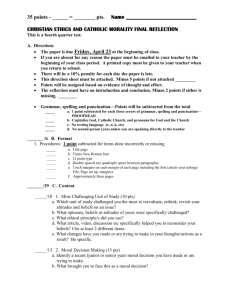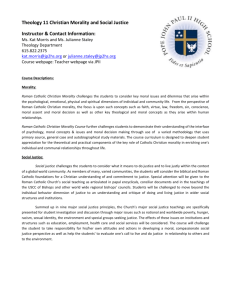
CE2056 Syllabus
http://www.gtu.edu/syllabi/l998-Spring/Area-IV/CE2056.html
FUNDAMENTAL MORAL THEOLOGY
Jesuit School of Theology at Berkeley
James T. Bretzke, S.J.
CE 2056; Spring 1998 Class: Tuesdays 8:10-1 1:00AM
Office Hours: MonlTues/ 3:00--4:30 (Other times by appointment)
Office phone: 549-5031 E-mail: jbretzke@jstb.edu or Bretzke237@aol.com
Course Description
This one-semester course is designed as an introduction to fundamental moral theology in the Roman
Catholic tradition. The principal themes to be treated include: The Nature of, and a Methodological
Model for Approaching Fundamental Moral Theology; An Historical Overview of Casuistry and
Pre-Vatican II Moral Theology; The Moral Person and Moral Community; The Christian Vocation: Call
and Response; Conscience and the Fundamental Option; Moral Norms and the Natural Law; Virtue and
Teleology; Evaluations of Moral Acts; Sin, Conversion and Reconciliation; Roles of the Magisterium;
Current Tensions in Moral Theology, and Prospects for the Future. Selected issues in special ethics,
especially from areas of sexual and medical ethics will be discussed in terms of applying the
fundamental themes of moral theology to practical life situations. The course format will be lecture and
questions based on both lecture input and the course readings. Small discussion groups, focusing on
sexual and biomedical ethics, will be held a few times in place of the regular class during the second half
of the semester.
Course written assignments and exams
The mid-term exam will be a 20 minute oral exam based on the course lectures, readings, and one (1)
case study prepared and submitted in advance by the student. The final exam will be a closed book
three-hour comprehensive written exam held during the final class session. In addition, at the time of the
final exam two (2) additional case studies are to be handed in. Each case study will be a maximum of
four (4) typed pages, double-spaced, and will detail the principal moral issues involved as well as an
outline of a proposed pastoral response to the case treated. Examples of the case studies will be provided
in class well before each exam.
Course Grading
Three principal factors will be taken into consideration for the final grade for the course: 1) careful
preparation of the assigned readings and active participation in each of the class meetings (40%); 2) the
case study and oral mid-term (25%); and 3) the case studies and written final exam (35%).
COURSE READINGS
REQUIRED Books
• Bretzke, James T., S.J. A Morally Complex World. CE 2056 Course Notes for Fundamental Moral
Theology (for use of students only).
• Gula, Richard M., S.S. Reason Informed by Faith: Foundations of Catholic Morality. New York:
Paulist Press, 1989 (329 pages).
• Fuchs, Josef, S.J. Christian Morality: The Word Became Flesh. Translated by Brian McNeil.
Washington, D.C.: Georgetown University Press; Dublin: Gill and Macmillan, 1987. (Selections).
ISBN 0-87840-452-A
• Mahoney, John, S.J. The Making of Moral Theology: A Study of the Roman Catholic Tradition. The
Martin D’Arcy Memorial Lectures, 1981-2. Oxford: Oxford University Press, 1987. (347
pages). ISBN 0-19-826730-4
• “Part Three: Life in Christ (selections).” In Catechism of the Catholic Church. Garden City:
Doubleday Image, 1995. ISBN 0-385-47967-0. Also available on the Internet at:
CE2056 Syllabus
http://www.gtu.edu/syllabi/l998-Spring/Area-IV/CE2056.html
http://www.christusrex.org/wwwl/CDHN/ccc.html
REQUIRED Articles
NB: See Reserve Box at JSTB for CE 2056 for copies of these articles
• Bretzke, James T., S.J. “Cultural Particularity and the Globalization of Ethics in the Light of
Inculturation.” Pacifica 9 (1996): 69-86.
• Cahill, Lisa Sowle. “Catholic Sexual Ethics and the Dignity of the Person: A Double Message.”
Theological Studies 50 (1989): 120-150.
• Callahan, Daniel. “The Sanctity of Life Seduced: A Symposium on Medical Ethics.” First Things
(April 1994): 13-15.
• Farley, Margaret A., R.S.M. “Sexual Ethics.” In Sexuality and the Sacred: Sources for Theological
Reflection, 54-67. Edited by James B. Nelson and Sandra P. Longfellow. Louisville:
Westminster/John Knox Press, 1994.
Also found in Reich, Warren T., ed. Encyclopedia of Bioethics. New York: Free Press, 1978,
1982.
• Glaser, Thomas. “Conscience and Super-Ego: A Key Distinction.” Theological Studies 32 (1971):
30-47.
Also found in Conscience: Theological and Psychological Perspectives, 167-188. Edited by C.
Ellis Nelson. New York: Newman Press [Paulist], 1973.
• Haring, Bernard, C.Ss.R. “Sins against Chastity within Marriage. In Id. Shalom: Peace. The
Sacrament of Reconciliation, 242-264. Rev. ed. Garden City: Doubleday Image Book, 1967,
1969.
• John Paul II, Pope. “You Shall Not Kill.” Chapter 3 of Evangelium vitae (Encyclical Letter on the
Value and Inviolability of Human Life). Origins 24 (6 April 1995): 707-7 16. Also found on the
Internet at:
http://www.vatican.va/holy_father/john paul ii/encyclicals/john-paul-ii encyclical 25-march-1995
• Johnstone, Brian V., C.Ss.R. “From Physicalism to Personalism.” Studia Moralia 30 (1992): 71-96.
• Keenan, James, S.J. “The Distinction Between Goodness and Rightness.” Chapter One in Idem,
Goodness and Rightness in Thomas Aquinas’ Summa Theologiae, 3-20. Washington, D.C.:
Georgetown University Press, 1992.
• Kopfensteiner, Thomas R. “Protecting a Dignified Death: A Contemporary Challenge for Moral
Reasoning.” New Theology Review 6 (November 1993): 6-27.
• Paul VI, Pope. Humanae vitae (Encyclical Letter on the Regulation of Births). 25 July 1968. AAS
60 (1968): 481-503; in Vatican Council II. More Post-Conciliar Documents, ed. Austin Flannery,
O.P., (Collegeville: The Liturgical Press, 1982): 397-4 16. Also available on the Internet at:
http://www.vatican.va/holy_father/paulyi/encyclicals/hf_p-vi_enc_25071 968_humanae-vitae_en.s
• Sklba, Bishop Richard J. “Theological Diversity and Dissent within the Church.” In Shepherds
Speak: American Bishops Confront the Social and Moral Issues that Challenge Christians Today,
20-33. Edited by Dennis M. Corrado and James F. Hinchey. New York: Crossroad, 1986.
• Thomas Aquinas. “Summa Theologiae: Question 94. Of the Natural Law.” In Readings in Moral
Theology,No. 7:Natural Law and Theology, 101-113. Edited by Charles E. Curran and Richard A.
McCormick, S.J. Mahwah: Paulist Press, 1991. Also available on the Internet:
http://www.knight.org/advent/summa1209400.htm
• Vatican II. Selections: Lumen gentium #25, #39-42 Available on the Internet at:
http://www.vatican.va/archive/ii_vatican_council/constitutions/vatican-ii_constitution2 1-nov-196
• Gaudium et spes #16, #47-52. Available on the Internet at:
http://www.vatican.va/archive/ii_vatican_council/constitutions/vatican-iiconstitution_7-dec- 1965_
• Dignitatis humanae #2. Available on the Internet at:
http://www.vatican.va/archive/ii_vaticancouncil/declarations/vatican-ii_declaration_7-dec-l 965_d
• Wildes, Kevin W., S.J. “Ordinary and Extraordinary Means and the Quality of Life.” Theological
Studies 57 (1996): 500-512.
RECOMMENDED Books
CE2056 Syllabus
http://www.gtu.edu/syllabi/l998-Spring/Area-IV/CE2056.html
Basic Reference Works
• Childress, James F., and Macquarrie, John, eds. The New Dictionary of Christian Ethics.
Philadelphia: Westminster Press, 1967, 1986.
• Flannery, Austin P., O.P. ed. Vatican Council II: More Post Conciliar Documents. Collegeville:
The Liturgical Press, 1982.
RECOMMENDED Articles
NB: See Reserve Box at IJSTB for CE 2056 for copies of these articles
• Bretzke, James T., S.J. “Scripture: the ‘Soul’ of Moral Theology? -- The Second Stage.” Irish
Theological Quarterly 60 (1994): 259-271.
• Fuchs, Josef, S.J. “The Absoluteness of Moral Terms.” Gregorianum 52 (1971): 697-711.
Also found in Fuchs’ own Personal Responsibility and Christian Morality, trans. William
Cleves, et. al., (Washington, D.C.: Georgetown University Press, and Dublin: Gill and
Macmillan, 1983), 115-152. Also found in Readings in Moral Theology, No. 1: Moral Norms
and Catholic Tradition, ed. Charles E. Curran and Richard A. McCormick, S.J. (New York:
Paulist Press, 1979), 94-137; as well as in Introduction to Christian Ethics: A Reader, ed.
Ronald P. Hamel and Kenneth R. Himes, O.F.M. (New York: Paulist Press, 1989), 487-512.
• Janssens, Louis. “Personalism in Moral Theology.” In Moral Theology: Challenges for the Future.
Essays in Honor of Richard A. McCormick, S.J., 94-107. Edited by Charles E. Curran. New York:
Paulist Press, 1990.
• Knauer, Peter, S.J. “The Hermeneutic Function of the Principle of the Double Effect.” In Readings
in Moral Theology, No. 1: Moral Norms and Catholic Tradition, 1-39. Edited by Charles E. Curran
and Richard A. McCormick, S.J. New York: Paulist Press, 1979.
• McCormick, Patrick, C.M. “Human Sinfulness: Models for a Developing Moral Theology.” Studia
Moralia 26 (1988): 61-100.
** NB Other Recommended books and articles will be noted throughout the course, and are also
indicated in the xeroxed Course Notes.
_________________________________________________________________________________
SYLLABUS OF COURSE THEMES & READINGS
• NB There is obviously a certain progression as well as overlap and interrelation among these various
themes. In general, we will move from a grounding in theory, concepts, and tradition, to a
consideration of contemporary church teachings, theological opinions and application to concrete
moral issues.
• Refer to the Course Readings for complete page numbers and bibliographical information on these
assigned readings.
• Readings listed for each week should be completed by class-time of each week.
Week 1 Introduction, Methodology, and Overview of Contemporary Moral Theology [Feb.. 3]
Week 2 History of Moral Theology and Introduction to Basic Concepts [Feb. 10]
Fuchs, “Vatican II: Salvation, Personal Morality, Right Behavior.” Ch. 2 in Christian Morality:The
Word Became Flesh.
Fuchs, “Morality: Person and Acts.” Ch. 7 in Christian Morality: The Word Became Flesh.
Jolmstone, “From Physicalism to Personalism.”
Mahoney, The Making of Moral Theology, Chs. 1-2.
Week 3 The Moral Person, Freedom, Conscience, and Community [Feb. 17]
Vatican II: Gaudium et spes #16; Dignitatis humanae #2
Fuchs, “Our Image of God and the Morality of Innerworldly Behavior.” Ch. 3 in Christian
Morality:The Word Became Flesh.
CE2056 Syllabus
http://www.gtu.edu/syllabi/l998-Spring/Area-IV/CE2056.html
Fuchs, “The Phenomenon of Conscience: Subject-Orientation and Object-Orientation.” Ch. 8 in Id.
Christian Morality: The Word Became Flesh.
Glaser, “Conscience and Super-Ego: A Key Distinction.”
Catechism of the Catholic Church, “Part Three: Life in Christ” Section One, Ch. 1, Articles 1-3,
Article 6, Ch. 2, Articles 1-3,
Recommended: Fuchs, “Self-Realization and Self-alienation.” Ch. 10 Id. Christian Morality: The
Word Became Flesh.
Janssens, “Personalism in Moral Theology.”
Week 4 Moral Good and Evil; Rightness and Wrongness of Actions [Feb. 24]
Keenan, “The Distinction Between Goodness and Rightness.”
Catechism of the Catholic Church, “Part Three: Life in Christ” Section One, Ch. 1, Articles 4-5
Recommended: Knauer, “The Hermeneutic Function of the Principle of the Double Effect.”
Week 5 Moral Norms and Natural Law [Mar. 3]
Fuchs, “God’s Incarnation in a Human Morality.” Ch. 4 in Christian Morality: The Word Became
Flesh.
Thomas Aquinas. Summa Theologiae I-II, Question 94.
Mahoney, The Making of Moral Theology, Ch. 6.
Catechism of the Catholic Church, “Part Three: Life in Christ” Section One, Ch. 3, Article 1
Recommended: Fuchs, “The Absoluteness of Moral Terms.”
Week 6 Sin, Grace, Conversion, and Reconciliation [Mar. 11]
Mahoney, The Making of Moral Theology, Ch. 3.
Catechism of the Catholic Church, “Part Three: Life in Christ” Section One, Ch. 1, Article 8, Ch. 3,
Article 2
Recommended: McCormick, P. “Human Sinfulness: Models for a Developing Moral Theology.”
Week 7 Roles of Church Teaching and Tradition [Mar. 17]
NB Mid-Term Case Study Due on March 17th
Vatican II: Lumen gentium #25.
Fuchs, “Continuity in the Church’s Moral Teaching? Religious Liberty as an Example.” Ch. 11 in
Christian Morality: The Word Became Flesh.
Mahoney, The Making of Moral Theology, Ch. 4.
Catechism of the Catholic Church, “Part Three: Life in Christ” Section One, Ch. 3, Article 3
Sklba, “Theological Diversity and Dissent within the Church.”
SPRING BREAK: March 23-28 (NO CLASS)
Week 8 Roles of Church Teaching and Tradition, cont.; Virtue, Moral Discernment, and Use of
Scripture in Ethics [Mar. 31]
Fuchs, “Christian Morality: Biblical Orientation and Human Evaluation.” Ch. 1 in Id. Christian
Morality: The Word Became Flesh.
Mahoney, The Making of Moral Theology, Ch. 5.
Catechism of the Catholic Church, “Part Three: Life in Christ” Section One, Ch. 1, Article 7
Recommended: Bretzke, “Scripture: the ‘Soul’ of Moral Theology?
* *NB ORAL MID-TERMS HELD THIS WEEK (Based on Material from Weeks 1-7, and
Scheduled Outside of Regular Class-time)
CE2056 Syllabus
http://www.gtu.edu/syllabi/l998-Spring/Area-IV/CE2056.html
Week 9 Sexual Ethics I [April 7]
Farley, “Sexual Ethics.”
Vatican II, Gaudium et spes, Ch. 1, #47-52.
Paul VI, Humanae vitae (1968)
Mahoney, The Making of Moral Theology, Ch. 7.
Recommended: Fuchs, “Early Christianity in Search of a Christian Morality: 1 Cor 7.” Ch. 6 in
Christian Morality: The Word Became Flesh.
Fuchs, “Married Love: Christian Pluralism in the Twelfth Century.” Ch. 12 in Id. Christian
Morality: The Word Became Flesh.
Week 10 Sexual Ethics II [April 14]
Cahill, “Catholic Sexual Ethics and the Dignity of the Person: A Double Message.”
Catechism of the Catholic Church, “Part Three: Life in Christ” Section Two, Ch. 2, Articles 6, 9
Haring, Bernard, C.Ss.R. “Sins against Chastity within Marriage.
Week 11 Bioethics I [April 21]
Callahan, “The Sanctity of Life Seduced: A Symposium on Medical Ethics.’t
John Paul II, Ch. 3 of Evangelium vitae
Fuchs, “Disposing of Human Life: Recent Problems in Bioethics.” Ch. 13 in Christian Morality:
The Word Became Flesh.
Catechism of the Catholic Church, “Part Three: Life in Christ” Section Two, Ch. 2, Article 5
Recommended: Fuchs, “Catholic’ Medical Moral Theology?.” Ch. 14 in Id. Christian Morality: The
Word Became Flesh.
Week 12 Bioethics II [April 28]
Kopfensteiner, “Protecting a Dignified Death: A Contemporary Challenge for Moral Reasoning.”
Wildes, Kevin W., S.J. “Ordinary and Extraordinary Means and the Quality of Life.” Theological
Studies 57 (1996): 500-5 12.
Week 13 Inculturation and Discernment in Moral Theology [May 5]
Vatican II, Lumen gentium #39-42
Bretzke, “Cultural Particularity and the Globalization of Ethics in the Light of Inculturation.”
Fuchs, “Conscience in a Pluralistic Society.” Ch. 9 in Christian Morality: The Word Became Flesh.
Mahoney, The Making of Moral Theology, Ch. 8.
Week 14 Pastoral Catechesis of Fundamental Moral Theology [May 12]
Catechism of the Catholic Church, “Part Three: Life in Christ” Section Two, Ch. 2, Articles 1-4;
7-8, 10
* *NB FINAL REGULAR CLASS DAY (with Course Evaluation)
Week 15 Final Examination [May 19]
**NB Final Exam Case Studies also due on May 19th **NB Final Exam Will be Comprehensive,
Closed Book, In-Class







